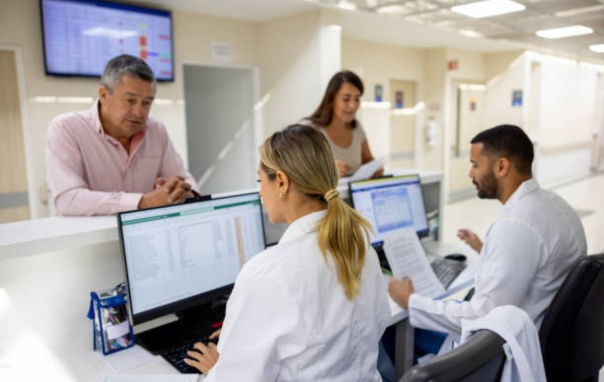Medical Office Administrators play a key role in ensuring the efficient health service operations of medical practices, clinics, and hospitals. These professionals serve as the backbone of medical office environments, managing everything from patient records to appointment scheduling while supporting medical professionals in delivering quality of care. A Medical Office Administrators course provides students with the specialized skills and knowledge necessary to excel in this dynamic field. Whether you’re considering a career change or looking to enhance your administrative skills, a diploma program in Medical Office Administration or Office Administration – Health Services offers a comprehensive education that prepares you for a rewarding career with numerous opportunities in the healthcare sector. This blog explores what you can expect to learn during your training and how these skills translate to real-world success.
Core Curriculum Components
Medical Terminology and Understanding the Human Body
One of the foundational elements of any Medical Office Administrators course is developing proficiency in medical terms and understanding basic concepts related to the human body. This knowledge helps administrators effectively communicate with the healthcare team and accurately process medical documents. Students learn:
- Anatomical terminology and body systems
- Common medical abbreviations and symbols
- Disease processes and treatment terminology
- Pronunciation and spelling of complex medical vocabulary
- Terminology specific to different medical specialties
This specialized vocabulary is essential for tasks like medical transcription, creating accurate documents, and maintaining proper patient records.
Electronic Health Records Management
Modern healthcare has largely transitioned from paper records to sophisticated Electronic Medical Records (EMR) and Electronic Health Records (EHR) systems. A quality Medical Office Administrator program provides hands-on experience with:
- Industry-standard health records management systems
- Security and privacy protocols for Personal Health Information
- Documentation standards and practices
- Electronic filing and retrieval methods
- Integration of various health documents into comprehensive patient files
Students practice with specialized software designed to simulate real-life experiences in medical environments, ensuring they’re comfortable with the technology used in today’s healthcare facilities.
Medical Office Procedures
The day-to-day operations of a medical office require specific knowledge of medical office procedures that maintain operational success. Your coursework will cover:
- Patient management processes from registration to checkout
- Appointment scheduling systems and strategies
- Medical billing and insurance processing
- Supply inventory management
- Mail processing and correspondence handling
- Records management for health services
- Office equipment technology applications
Through practical applications and Medical Office Simulation exercises, students learn to manage these procedures efficiently while maintaining the high standards expected in healthcare settings.

Administrative Skills and Office Management
Beyond medical-specific knowledge, strong administrative skills form the backbone of success in this field. Students develop proficiency in:
- Keyboarding skills and document formatting
- Office equipment operation and troubleshooting
- Filing systems and information management
- Meeting and event coordination
- Travel arrangements for medical professionals
- Time management and prioritization techniques
- Office management principles for healthcare environments
These administrative tasks require attention to detail and organizational culture awareness, ensuring the medical setting operates smoothly for both patients and practitioners.
Medical Billing and Financial Management
Financial aspects of healthcare administration require specialized knowledge of:
- Health insurance systems and terminology
- Billing systems and processing insurance claims
- Client billing records maintenance
- Accounting software specifically for healthcare
- Basic accounting processes for medical offices
- Financial literacy in healthcare contexts
- Handling patient payments and financial inquiries
Students gain practical experience with common medical billing software and learn the accounting practices specific to healthcare environments.
Interpersonal and Communication Skills
Perhaps the most crucial component of medical office administration is developing strong interpersonal skills for interacting with patients, healthcare teams, and the medical community. Coursework emphasizes:
- Professional verbal and written communication
- Client service skills for diverse patient populations
- Effective communication strategies in stressful situations
- Conflict resolution techniques
- Cultural sensitivity in healthcare settings
- Managing difficult conversations with respect and empathy
- Appropriate response to communications in various formats
These essential skills ensure administrators can provide compassionate support while maintaining professional boundaries.
Professional Ethics and Standards
Working in healthcare requires strict adherence to professional ethics and industry standards. Students learn about:
- Codes of ethics governing healthcare administration
- Confidentiality requirements and privacy legislation
- Medical ethics considerations in administrative roles
- Accreditation standards for healthcare facilities
- Ministry of Health regulations and compliance
- Professional boundaries and ethical decision-making
- Legal responsibilities of health administrators
This knowledge helps ensure administrators contribute to maintaining the high ethical standards expected in healthcare.
Practical Learning Components
Field Placement Experience
A crucial component of Medical Office Administrators education is the field placement component, which provides invaluable hands-on experience in actual healthcare settings. During placement, students:
- Apply classroom learning to real-world situations
- Develop relationships with potential employers
- Build industry experience and professional references
- Practice non-invasive clinical tasks under supervision
- Engage with the healthcare team as a contributing member
- Experience different health care settings and organizational cultures
Central College, Mississauga maintains strong relationships with placement partners including medical clinics, family health centres, hospitals, long-term care facilities, and government health agencies throughout the community.
Medical Office Simulation Labs
Before entering their field placement, students practice in simulated office environments where they can develop confidence in:
- Scheduling appointments using actual software systems
- Managing electronic records and patient files
- Processing billing through insurance systems
- Handling complex administrative scenarios
- Executing administrative tasks in a realistic setting
- Working with the range of skills required in daily operations
These simulated environments provide a safe space to develop competencies transferable to real medical office environments.
Specialized Software Training
Today’s medical offices rely heavily on technology, and students receive training on:
- Electronic Medical Records software
- Appointment scheduling applications
- Medical billing programs
- Accounting software for healthcare
- Word processing and spreadsheet applications
- Database management systems
- Additional program-specific software relevant to healthcare
This technical training ensures graduates are comfortable with the digital tools that drive modern healthcare administration.

Career Pathways and Opportunities
Graduates of Medical Office Administrators programs find diverse career opportunities across the healthcare field:
Medical Receptionist
As the first point of contact for patients, Medical Receptionists manage front-desk operations, including:
- Greeting and registering patients
- Scheduling appointments
- Answering phone inquiries
- Collecting patient information
- Maintaining a welcoming environment
Medical Secretary
In this role, graduates provide administrative support to medical professionals through:
- Managing correspondence
- Preparing medical documents
- Coordinating schedules
- Arranging meetings
- Supporting the operational success of the medical practice
Medical Transcriptionist
Specialists in this area convert dictated recordings from healthcare providers into written reports by:
- Transcribing medical notes and reports
- Editing and formatting documents
- Ensuring accuracy of medical terminology
- Managing electronic records
- Maintaining patient confidentiality
Medical Billing Specialist
These professionals manage the financial aspects of healthcare by:
- Processing insurance claims
- Verifying patient coverage
- Managing client billing records
- Resolving billing discrepancies
- Ensuring compliance with billing regulations
Health Records Clerk
Focused on information management, these roles involve:
- Organizing and maintaining patient records
- Ensuring data accessibility and security
- Converting paper records to electronic formats
- Retrieving information for authorized personnel
- Maintaining filing systems
These diverse career options provide graduates with flexibility to find roles aligned with their strengths and interests within the healthcare sector.
Why Choose Central College, Mississauga
Central College, Mississauga stands out as an exceptional choice for your Medical Office Administration education for numerous compelling reasons:
Program Excellence
- Industry-Connected Curriculum: Developed in consultation with healthcare professionals like Judi Joslin and Wendy Fisher to ensure relevance
- Comprehensive Training: Our diploma in Medical Office Administration covers all essential skills from medical terminology to advanced electronic health record management
- Common Semester Approach: Begin with a common semester focusing on core competencies before specializing in health services
- Flexible Learning Options: Choose from full-time, part-time, and online delivery formats to accommodate different schedules
State-of-the-Art Facilities
- Modern Simulation Labs: Practice in environments that replicate actual medical offices, clinics, and hospital departments
- Current Technology: Train on the same specialized software and office equipment used in prestigious hospitals and healthcare facilities
- Digital Learning Resources: Access to extensive learning materials online for reinforced study outside class hours
- Technical Support: Assistance with all Technology Requirements to ensure students can focus on learning
Exceptional Student Support
- Personalized Guidance: From application to graduation, our student service team provides individualized support
- International Student Recruitment: Dedicated assistance for international students navigating requirements and cultural transitions
- Career Development Services: Comprehensive job search and placement assistance for career success
- Financial Support Options: Clear information about program costs, tuition fees, and financial aid options
Field Placement Advantages
- Quality Partnerships: Relationships with respected placement partner agencies including Ottawa Hospital and various medical clinics
- Diverse Experiences: Rotations through different healthcare environments including occupational therapy clinics and residential care facilities
- Preplacement Support: Comprehensive preparation through our Clinical Pre-placement website
- Placement Pass Guarantee: Support systems to ensure you meet all requirements for field placement

Post-Graduation Benefits
- Transfer Credit Opportunities: Pathways to advanced education at partner institutions like Centennial College and Douglas College
- Employment Connections: Strong relationships with employers seeking qualified graduates
- Alumni Network: Connection to professionals working throughout the healthcare field
- Continuing Education Options: Additional specialist certifications and education electives
With affordable tuition amounts comparable to other Ontario Colleges, reasonable student fees including manageable CSI Advocacy Fee and CSI Extended Health & Dental Plan costs, Central College represents an excellent investment in your future. Our program has achieved outstanding placement rates with graduates working in medical environments across the region, from small family health centres to large hospitals.
Conclusion
A Medical Office Administrators course provides far more than basic office skills—it offers comprehensive training in the specialized knowledge required to support the healthcare field effectively. From mastering medical terminology and electronic records systems to developing critical interpersonal skills and understanding healthcare ethics, graduates emerge prepared for the multifaceted demands of modern medical offices. The combination of classroom learning, hands-on practice, and field experience creates well-rounded professionals who can confidently step into various administrative roles within healthcare. For those seeking a stable, rewarding career with opportunities for growth and the satisfaction of contributing to patient care, Medical Office Administration offers an exciting opportunity to become an essential health care support professional whose work makes a meaningful difference in healthcare delivery every day.
